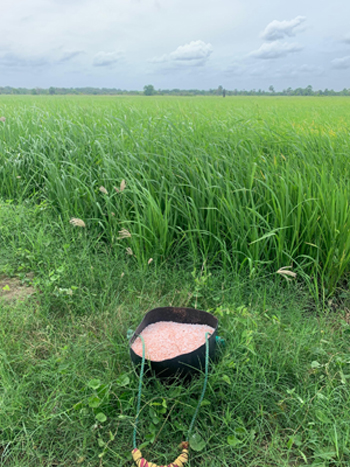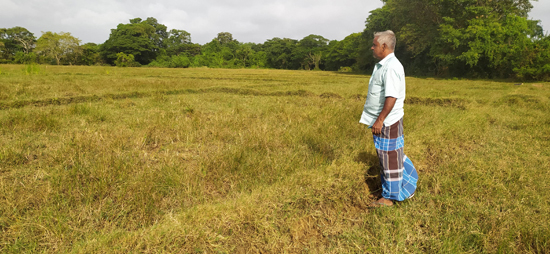News
Pests ravage crops as confusion reigns over pesticide policy

Kilinochchi: Crops have become more vulnerable to weeds and insects with the shortage of pesticides
Almost half the crops in areas of the north have been destroyed by pests and weeds, and many farmers blaming the pesticides ban for their losses have returned or cancelled permits for leased paddy lands.
The biggest menace is from stem borers, which are widespread in the region. The insects bore into plant stems and can destroy 50 per cent of the harvest.
For farmers in Ooriyaan, an agrarian colony in Kilinochchi, the impact is severe because they commenced their Yala season cultivation late, in mid-April, due to delays by regional agrarian authorities in finalising farming schemes under the Iranaimadu irrigation project, a major irrigation tank in the district.
The late-planted crops have become more vulnerable to weeds and insects with the shortage of pesticides following the government ban on imported chemical pesticides and fertilisers.
“Most farmers in our union have reported more than 50 per cent of damage in their plots of paddy lands due to stem borer spread,” the Secretary of the Ooriyan Farmers Federation in Kilinochchi, S. Jeganthan, said.
“Many are considering abandoning their damaged paddy lands or burning them to avoid the further spread of weeds and pests – but as farmers, how can we do that?”
Most of the affected farmers cannot claim compensation for the damaged crops because they failed to obtain insurance from the Department of Agrarian Development.
Under the scheme, farmers are entitled to receive government compensation amounting to at least 40 per cent of the total yield in the event of damage caused by weeds and natural disasters.
Mr. Jeganathan said farmers had appealed to the District Secretary but had been told that their failure to begin cultivation at the scheduled time made them ineligible to claim compensation.
Farmers in several areas have abandoned cultivation, both paddy and vegetable crops, due to the lack of pesticides and weedicides.
With less than a month before cultivation for the next Maha season in early September, farmers say they are facing a bleak future without access to chemical fertilisers and pesticides.
Many have already returned or cancelled permits for leased paddy lands after considering they face an acute drop in the paddy yield rate – up to half the crop.
On July 31, the Minister of Finance, Basil Rajapaksa, issued a gazette notification amending import restrictions under the Imports and Exports (Control) Act, allowing imports of chemical fertilisers with immediate effect.
The Controller-General of Imports and Exports, Damayanthi Karunaratne, consequently on Monday issued a circular calling for applications to obtain approval for imported fertiliser.

Anamaduwa: A despondent farmer looks on at his paddyfield. Pic by Hiran Priyankara
The chemical fertiliser compounds allowed under the Finance Minister’s gazette notification were: ammonium nitrate mixed with calcium carbonate, minerals consisting of superphosphates, and minerals or fertilisers containing two or three fertilising elements of nitrogen, phosphorous and potassium.
On Thursday, the Presidential Secretariat shot back the circular issued by the Finance Minister, reiterating that the government would not backtrack from its commitment to 100 per cent organic farming.
Addressing a press briefing labelled “Has the ban on chemical fertilisers been lifted?” at the newly-opened Presidential Media Centre, the Secretary to the Ministry of Agriculture, Senior Professor Udith K. Jayasinghe, said only natural minerals and chelated matter produced from plant nutrients would be imported as essential for the biological enrichment of soil.
The Secretary further pointed out that since the use of organic fertiliser was a new experience for many farmers, a mechanism had been put in place to monitor the practice on a weekly basis, and plans were underway to apply new technologies and techniques to farming.
The Secretary to the Treasury, S.R. Attygalle, said despite import restrictions, certain decisions had to be taken in the national interest, but those decisions would not contravene policy.
The Director-General of the Department of Agriculture, Dr. Ajantha de Silva, told the briefing that plans were in place to provide the required amount of organic fertiliser to each area based on a code given to the farmers following a soil test. The soil tests are scheduled to commence next week.
Meanwhile, another gazette notification on Thursday, issued by the Registrar of Pesticides, Dr. J.A. Sumith, detailed new rules for the Pesticide Technical and Advisory Committee.
Under the new rules, everyone on the eight-member committee is required to declare that he or she has no financial or other interest in the area. Members are also barred from disclosing matters under discussion by the committee.

